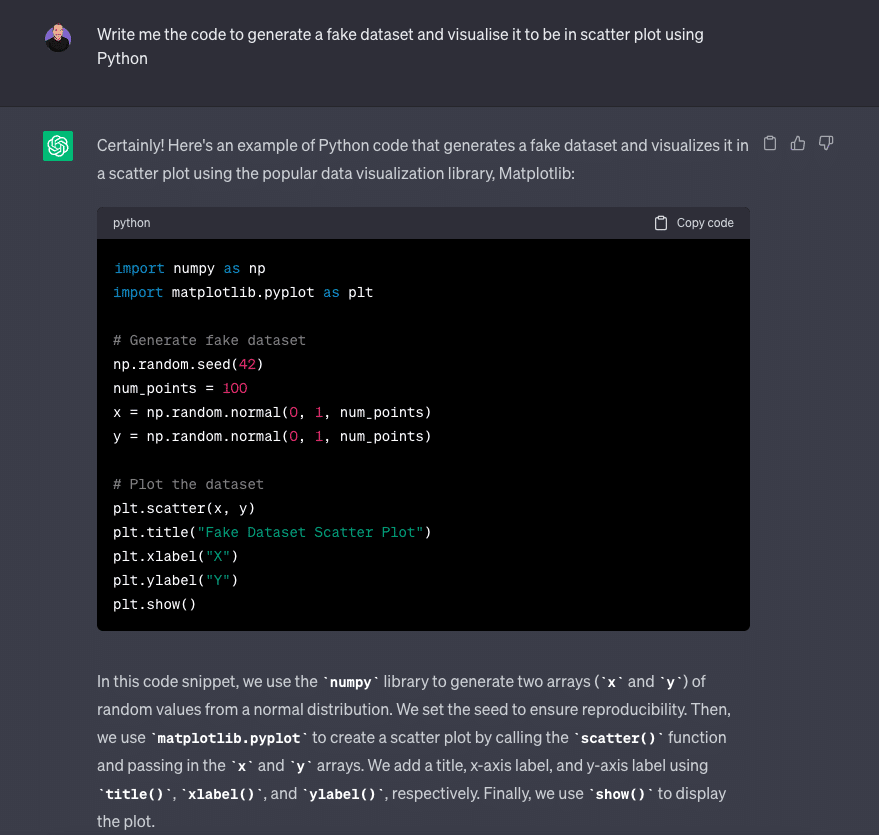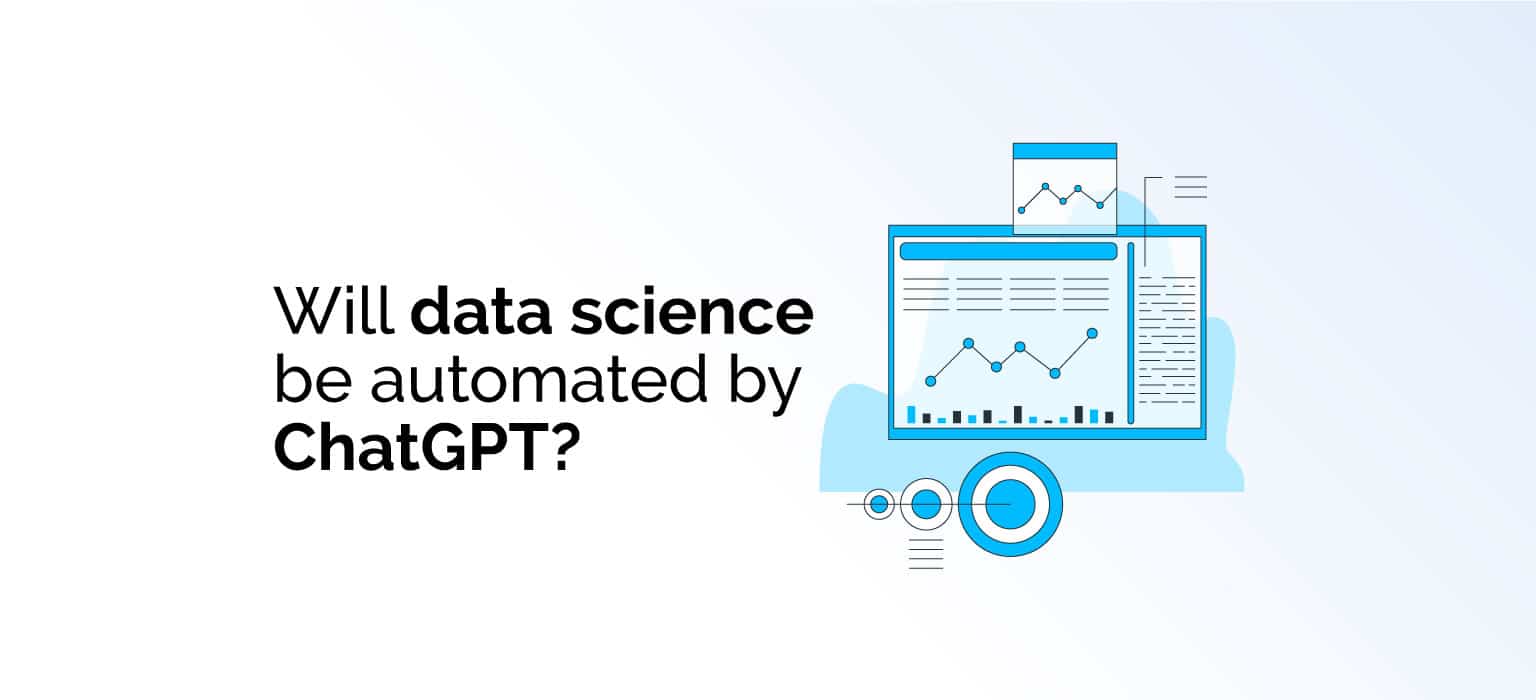I bet that if you’re in data science, the first thing that popped into your head after using ChatGPT was: “Will this thing replace me?” Well, let’s be honest here. When you saw this, your initial reaction might’ve been, “Whoa, is this some futuristic stuff? Can I get the winning lottery numbers already?” No? Only me? Alrighty, moving on.
ChatGPT is a great tool when it comes to assisting with certain tasks in data science like data cleaning or preprocessing, but can it do the job on its own? Data science is obviously a complex field that requires a lot of skills. It’s not that you can automate the whole process with a single prompt, though.
However, the ‘threat’ is real and needs attention. Let’s dive deeper into it.
Will ChatGPT replace data scientists?
While ChatGPT certainly has the ability to assist with a lot of aspects of the data science field, it’s highly unlikely to completely replace the role of humans in data science.
In order to be a data scientist you need to have a deep understanding of:
- Data analysis
- Statistical modeling
- Machine learning algorithms
- Domain expertise
These skills will allow you to make critical decisions, interpret highly complex results, and design tailored solutions for very specific problems. True, ChatGPT can provide automated insights and assists in some tasks, but only in routine ones. The expertise and creativity of data scientists are still invaluable when it comes to tackling complex problems or exploring new approaches.
Moreover, data scientists bring a unique contextual understanding and ethical considerations to the data science field. They’re able to distinguish between relevant variables, contextualize data within specific domains, and navigate between ethical challenges that arise along the way.
Obviously, I’m going to ask ChatGPT as well – can’t go wrong, right?

Welp, glad we got that sorted out.
What is the future of data science after ChatGPT?
In all honesty, the future of data science after ChatGPT will bring both opportunities and challenges.
With the introduction of ChatGPT and similar AI models, data scientists can now leverage its capabilities to automate certain tasks that are time-consuming. This will allow them to be more productive and more efficient in different and more important tasks. Moreover, they can use such tools to assist in generating ideas, exploring new data patterns, and gaining preliminary insights easier and faster.
However, as stated above, it’s highly unlikely that ChatGPT alone can replace human data scientists entirely. Sure, it can provide automation on many things that take time but it doesn’t possess any quality that data scientists have. Critical thinking, creativity, and the ability to interpret complex results are just some of the qualities that humans have over ChatGPT in data science. Plus, ChatGPT can’t communicate insights to the stakeholders and doesn’t understand the business objectives, disabling it from making strategic decisions based on context.
Read also: ChatGPT can code, but can’t replace developers
The future of data science alongside ChatGPT is that data scientists need to adapt and evolve with new technologies such as AI models. They need to understand how to benefit from these models and how to integrate them into their workflow. This will allow them to combine the power of AI and the strengths of the human touch. Leave the boring tasks to ChatGPT and focus on higher-level tasks such as problem formulation or data preprocessing.
In order to ‘stay alive’ in the data science field they will need to continue evolving their skill set and one of these skills will be the knowledge of how to use prompts. And by this, I mean to stay up with the latest developments in the AI world and machine learning.
Benefits of using ChatGPT in data science
As a data scientist, you should always be looking for new ways to make your work more efficient and more solution driven. And one of the ways is to integrate AI models into your workflow.
Using ChatGPT in data science has several benefits:
- Efficiency
- Idea generation
- Assistance with routine tasks
- Productivity boost
One of the most significant advantages of integrating ChatGPT in data science is its efficiency. Data scientists can save a lot of time by automating routine and mundane tasks that take valuable time and distract them from what really needs to be done. ChatGPT can automate tasks such as data preprocessing, initial data exploration, generating basic analysis reports, and such tasks that are time-consuming.
Using ChatGPT can also spark brand-new ideas and perspectives in data science by offering alternative approaches to specific problems and suggesting potential solutions. It can help a lot by simulating brainstorming sessions and offering new perspectives and new approaches to different problems.
By providing assistance with routine tasks, ChatGPT can remove the burden of mundane tasks from data scientists. This will allow them to offload these unnecessary time-consuming activities and focus on more complex and strategic aspects of data science.
And by being more efficient, having something to help with idea generation, and assistance with routine tasks, data scientists will definitely boost productivity to the roof. Using these benefits, data scientists will be more efficient in what matters instead of mundane tasks.

Disadvantages of using ChatGPT
Of course, there’s a drawback – like always. While ChatGPT is awesome on some things, there are certain disadvantages of using ChatGPT in the context of data science.
Here are some disadvantages of using ChatGPT in data science:
- Lack of domain expertise
- Inaccuracies
- Limited contextual understanding
- Ethical considerations
ChatGPT lacks the specialized knowledge and expertise in the domain that only human data scientists possess. It struggles when it comes to understanding the specific industry and field details, which can result in misinterpreted data and results.
And since ChatGPT is trained based on patterns from the training data, it may include a lot of inaccurate or biased information. It can provide incorrect or misleading analysis, which can lead to wrong conclusions if not carefully validated by a human expert.
While ChatGPT’s answers are completely coherent and mimic a human conversation, it lacks a deep understanding of the context of what it’s responding to. It doesn’t fully grasp the underlying business objectives or nuances necessary to make an accurate analysis or a decision.
The data that ChatGPT is trained on most likely contain either biased information, inaccurate ones, and probably some more that are not filtered out. Data scientists need to be on alert in order to filter out the ethically wrong information given from the results.
Note: This article is purely my opinion and does not state the viewpoint of Crossplag.

Korab has dedicated the past decade to the marketing industry, focusing specifically on the intricate field of Search Engine Optimization (SEO). Despite his background in development, Korab’s unwavering passion for marketing drives his commitment to success in the field.
He’s been an Inter fan since he was a kid, which makes him highly patient for results.
Korab does not hike.

